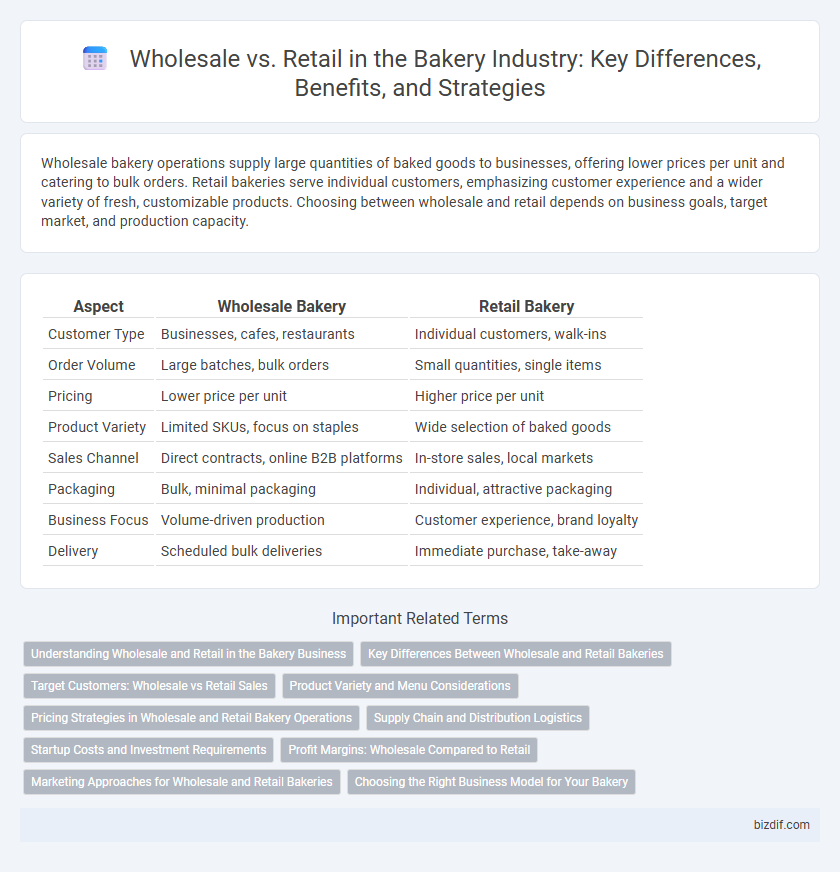Wholesale bakery operations supply large quantities of baked goods to businesses, offering lower prices per unit and catering to bulk orders. Retail bakeries serve individual customers, emphasizing customer experience and a wider variety of fresh, customizable products. Choosing between wholesale and retail depends on business goals, target market, and production capacity.
Table of Comparison
| Aspect | Wholesale Bakery | Retail Bakery |
|---|---|---|
| Customer Type | Businesses, cafes, restaurants | Individual customers, walk-ins |
| Order Volume | Large batches, bulk orders | Small quantities, single items |
| Pricing | Lower price per unit | Higher price per unit |
| Product Variety | Limited SKUs, focus on staples | Wide selection of baked goods |
| Sales Channel | Direct contracts, online B2B platforms | In-store sales, local markets |
| Packaging | Bulk, minimal packaging | Individual, attractive packaging |
| Business Focus | Volume-driven production | Customer experience, brand loyalty |
| Delivery | Scheduled bulk deliveries | Immediate purchase, take-away |
Understanding Wholesale and Retail in the Bakery Business
Wholesale in the bakery business involves selling large quantities of baked goods to other businesses such as cafes, restaurants, and grocery stores, emphasizing bulk orders and consistent supply. Retail focuses on direct sales to individual customers through storefronts or online platforms, accentuating product variety, freshness, and customer experience. Understanding the distinct demand patterns, pricing strategies, and distribution channels for wholesale and retail allows bakery owners to optimize inventory management and maximize revenue streams.
Key Differences Between Wholesale and Retail Bakeries
Wholesale bakeries primarily produce large quantities of baked goods for sale to businesses such as grocery stores, restaurants, and cafes, emphasizing bulk orders and consistent supply. Retail bakeries cater directly to individual consumers, offering a wide selection of fresh, ready-to-eat products with a focus on customer experience and product variety. Pricing strategies in wholesale favor volume discounts, while retail pricing reflects convenience and immediate availability.
Target Customers: Wholesale vs Retail Sales
Wholesale bakery sales primarily target businesses such as cafes, restaurants, and grocery stores seeking bulk quantities of baked goods at discounted prices. Retail bakery sales focus on individual consumers looking for freshly baked products in smaller quantities, often emphasizing variety and customization. Understanding the distinct needs of wholesale clients versus retail customers is crucial for optimizing sales strategies and inventory management.
Product Variety and Menu Considerations
Wholesale bakery operations focus on producing large quantities of a limited range of popular items to meet the demands of bulk buyers, emphasizing consistency and cost-efficiency. Retail bakeries offer a diverse menu with seasonal and specialty products to attract walk-in customers and encourage repeat visits. Product variety in retail settings often includes customized items and fresh-baked goods, while wholesale prioritizes standardized inventory to streamline production and distribution.
Pricing Strategies in Wholesale and Retail Bakery Operations
Wholesale bakery pricing strategies typically leverage bulk discounts and lower per-unit costs to attract large-volume buyers such as cafes and grocery stores, emphasizing economies of scale. Retail bakery pricing focuses on premium pricing models based on product freshness, branding, and customer experience to maximize profit margins on individual sales. Balancing competitive wholesale rates with profitable retail prices requires strategic cost analysis and market segmentation to optimize revenue streams for bakery operations.
Supply Chain and Distribution Logistics
Wholesale bakery operations focus on large-scale supply chain efficiency, utilizing bulk ingredient sourcing and centralized production facilities to reduce costs and streamline distribution logistics. Retail bakery distribution prioritizes localized supply chains with smaller batch production, enabling fresher product delivery and direct customer engagement through storefronts or online orders. Optimizing transportation routes and inventory management is critical for both models to ensure timely product availability and minimize waste.
Startup Costs and Investment Requirements
Wholesale bakery operations require higher startup costs, including large-scale equipment, commercial-grade ovens, and bulk ingredient purchases, resulting in significant upfront investment. Retail bakeries demand lower initial capital since they operate on a smaller scale, with expenses primarily focused on storefront setup, display cases, and customer service infrastructure. Wholesale investment emphasizes volume production efficiency, while retail investment prioritizes location and customer experience.
Profit Margins: Wholesale Compared to Retail
Wholesale bakery operations often achieve lower profit margins per unit compared to retail due to reduced pricing necessary for bulk sales. Retail sales allow bakeries to capitalize on higher price points and direct customer engagement, which enhances overall profitability. Efficient production and distribution in wholesale can offset slimmer margins through volume, making both models viable depending on scale and market reach.
Marketing Approaches for Wholesale and Retail Bakeries
Wholesale bakeries focus on relationship-building with large clients such as restaurants and grocery stores, using targeted B2B marketing strategies and volume-based pricing models to secure bulk orders. Retail bakeries emphasize local community engagement, social media advertising, and in-store promotions to attract individual customers and create brand loyalty. Both approaches require distinct messaging: wholesale highlights reliability and consistency, while retail highlights freshness and personalized customer experience.
Choosing the Right Business Model for Your Bakery
Selecting the right business model for your bakery hinges on understanding wholesale and retail dynamics. Wholesale offers larger volume sales to businesses such as cafes and grocery stores, providing steady income but lower profit margins per unit. Retail focuses on direct consumer sales, allowing for higher pricing and brand loyalty but requires more intensive marketing and customer service efforts.
Wholesale vs Retail Infographic

 bizdif.com
bizdif.com